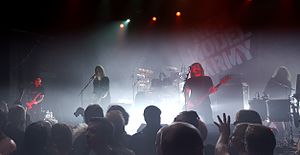New Model Army (band)
| New Model Army | |
|---|---|

New Model Army at The Forum, London on 11 December 2015 (left to right) Marshall Gill, Justin Sullivan, Ceri Monger, Dean White
|
|
| Background information | |
| Origin | Bradford, England |
| Genres | Punk rock, post-punk, folk rock |
| Years active | 1980–present |
| Labels | Abstract, EMI, Epic, Eagle, earMUSIC, Attack Attack Records |
| Associated acts | Justin Sullivan and Friends, Red Sky Coven, Blackballed |
| Website | www |
| Members |
|
| Past members |
|
New Model Army are an English rock band formed in Bradford, West Yorkshire in 1980 by lead singer, guitarist and main composer Justin Sullivan, bassist Stuart Morrow and drummer Phil Tompkins. Sullivan has been the only continuous member of the band, which has seen numerous line-up changes in its 35-year history. Their music draws on influences across the musical spectrum, from punk and folk to soul, metal and classical. Sullivan’s lyrics, which range from directly political through to spiritual and personal, have always been considered as a key part of the band’s appeal. By the time they began making their first records in 1983, Robert Heaton, a former drum technician for Hawkwind, had replaced Tompkins.
Whilst having their roots in punk rock, the band have always been difficult to categorise. In 1999, when asked about this, Sullivan said "We've been labelled as punks, post-punks, Goth, metal, folk – the lot, but we've always been beyond those style confines". Following a large turnover of personnel, both permanent and as touring members, as of January 2016 New Model Army comprise Sullivan, Dean White (keyboards and guitar), Michael Dean (drums), Marshall Gill (guitar) and Ceri Monger (bass).
The band were formed in Bradford, West Yorkshire in the autumn of 1980, taking their name from the military force established by Parliament during the English Civil War, and played their first concert in Bradford in October, playing songs based on their shared love of punk rock and Northern soul.
Sullivan used the alter ego of "Slade the Leveller" until the mid-1980s, supposedly so that he would not lose his unemployment benefits if the authorities realized he was making money from music. They continued to gig around the United Kingdom with little recognition, but in 1983 released their first singles "Bittersweet" and "Great Expectations" on Abstract Records, and were given airplay by Radio 1's John Peel.
...
Wikipedia
